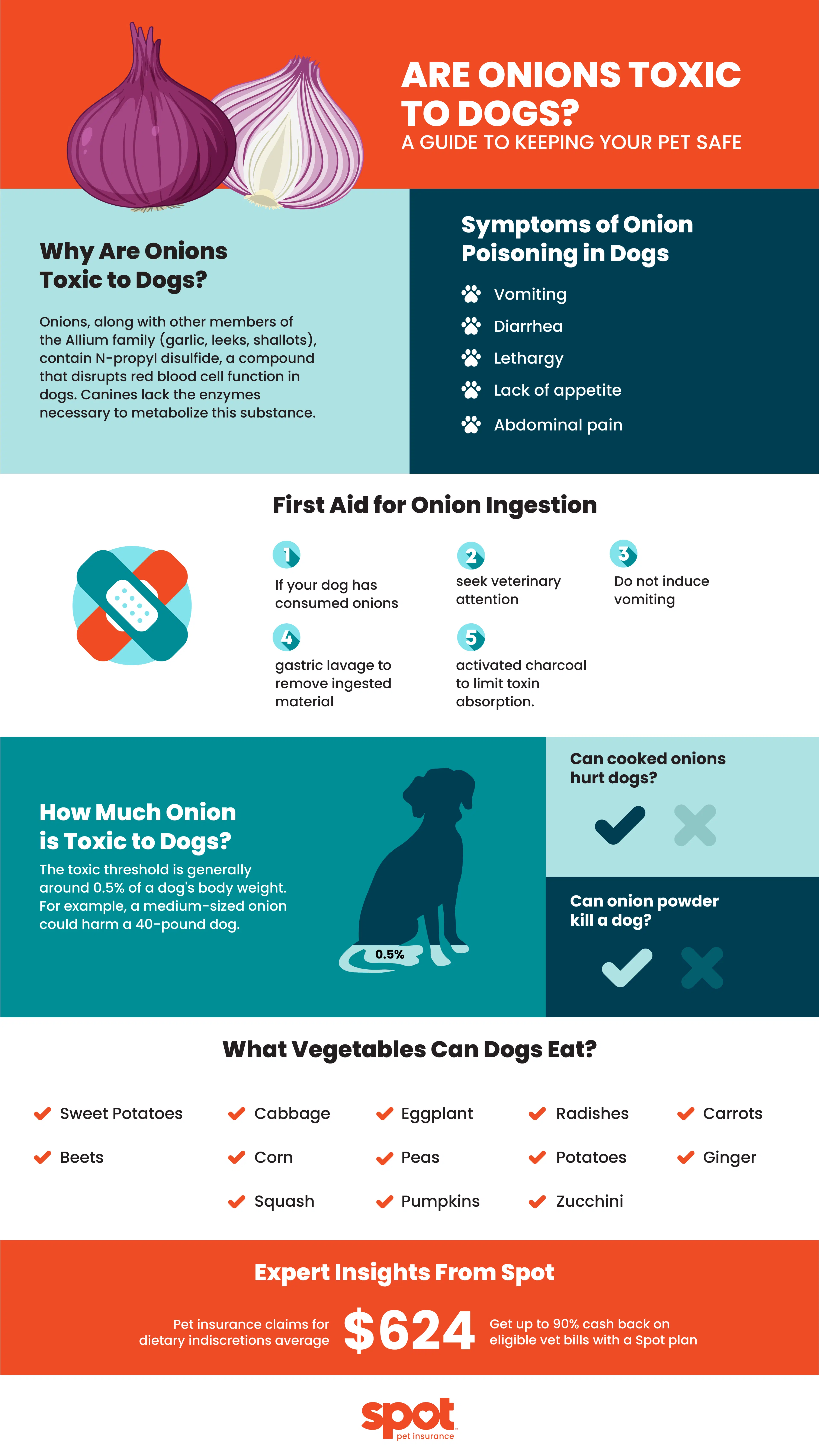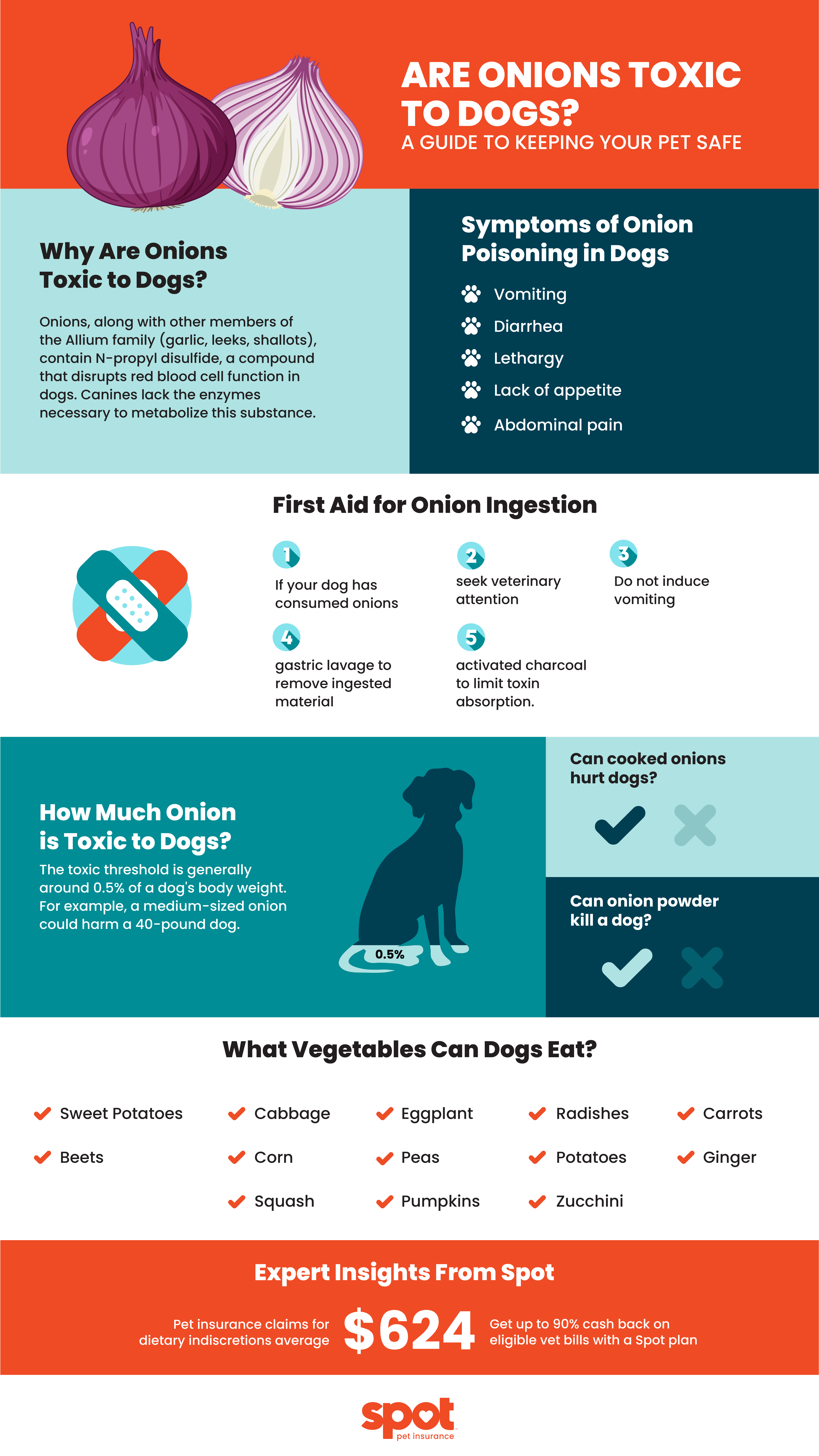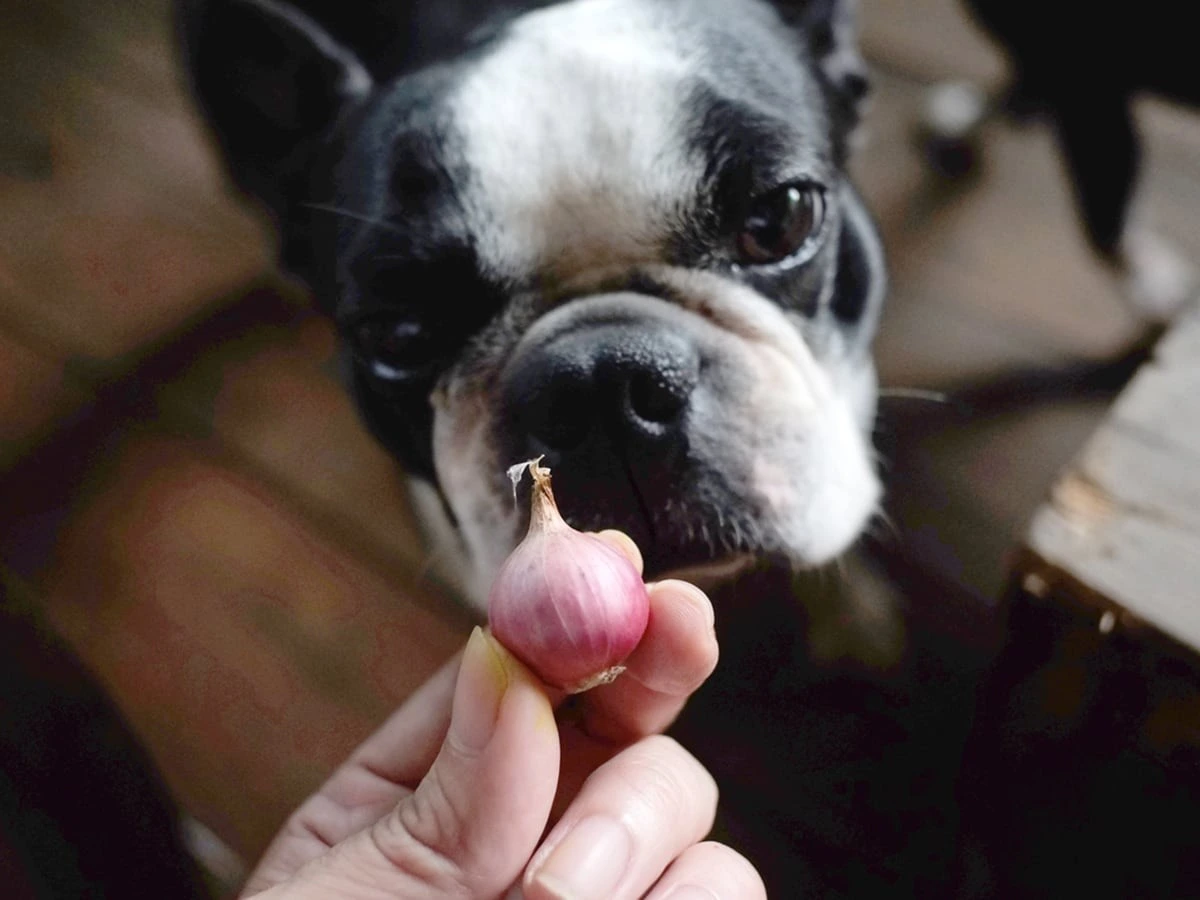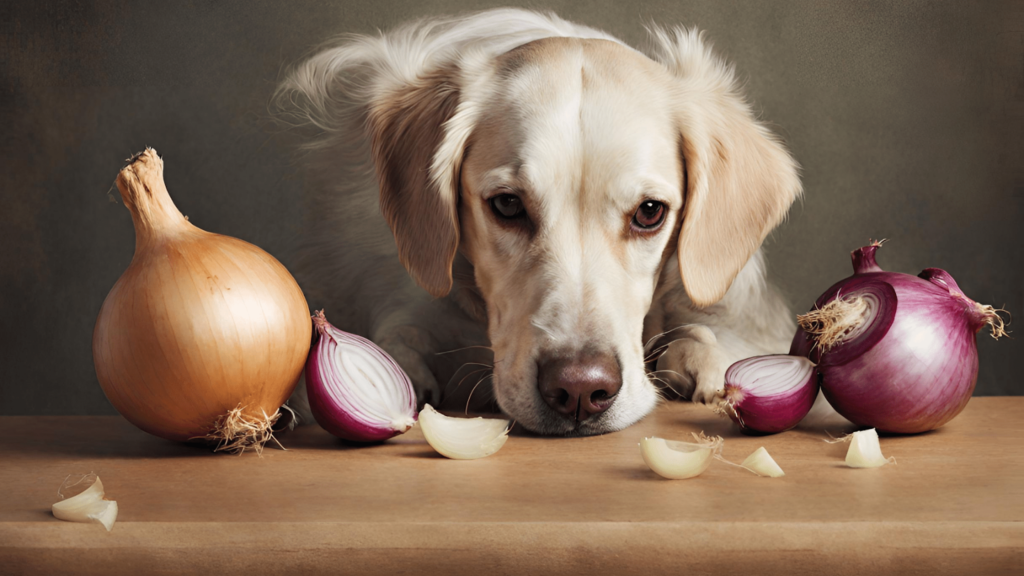No, dogs should not eat onions. Onions are toxic to dogs and can cause serious health issues.
Even small amounts can be harmful. Dogs are our loyal companions, and we want the best for them. This includes knowing what foods are safe for them to eat. Onions, while common in many human dishes, are dangerous for dogs.
They contain compounds that can damage a dog’s red blood cells, leading to anemia. Knowing what foods to avoid can help keep your furry friend healthy and happy. In this blog post, we will explore why onions are harmful to dogs and what symptoms to watch for if your pet accidentally consumes them. Stay informed to ensure your dog’s safety.
Dogs And Onions
Dogs are curious creatures. They love to sniff around and taste almost anything they find. This curiosity can sometimes lead them to foods that are not safe for them, like onions.
Onions are toxic to dogs. Consuming onions can lead to serious health issues. It’s crucial to understand why onions are harmful and how dogs might encounter them.
Common Foods Containing Onions
Onions are a staple in many kitchens. They add flavor to various dishes. However, this also means that onions can be present in foods you might not expect.
Think about your favorite soups, stews, and casseroles. Many recipes call for onions. Even some baby foods contain onion powder for added taste.
Packaged foods are another source. Read labels carefully. Onion powder is often an ingredient in sauces, gravies, and even some snacks.
How Dogs Encounter Onions
Dogs have a knack for finding food. They might get into the trash or sneak a bite from your plate. This is a common way dogs encounter onions.
Sometimes, well-meaning pet owners share table scraps. You might not realize the leftovers contain onions. This small act of sharing can have big consequences.
Outdoor barbeques and gatherings are another risk. People often drop food, and dogs are quick to snatch it up. Onion rings, grilled onions, and onion-laden salads are potential hazards.
Have you ever caught your dog eating something they shouldn’t? It’s a common scenario. Knowing what foods are dangerous helps you keep your furry friend safe.
What steps do you take to ensure your dog avoids harmful foods like onions? Share your tips and experiences in the comments!

Credit: spotpet.com
Toxic Compounds In Onions
Onions are a staple in many kitchens, adding flavor to countless dishes. However, they contain toxic compounds that can be harmful to dogs. Understanding these compounds is crucial to keeping your furry friend safe.
N-propyl Disulfide
N-propyl disulfide is one of the harmful substances found in onions. It damages your dog’s red blood cells, leading to a condition called hemolytic anemia. Even a small amount of onion can cause severe health issues.
I once fed my dog a piece of onion without realizing its toxicity. Shortly after, he showed signs of weakness and lethargy. A trip to the vet confirmed hemolytic anemia caused by N-propyl disulfide.
Effects On Red Blood Cells
The toxic compound N-propyl disulfide affects red blood cells by reducing their ability to carry oxygen. Your dog may experience symptoms like vomiting, diarrhea, and rapid breathing. Severe cases can lead to organ damage.
Have you ever wondered why your dog looks tired after eating something unusual? It might be due to the toxic effects of certain foods like onions. Always check the ingredients of what you feed your dog.
To protect your dog, avoid feeding them any food containing onions. This simple action can prevent a range of health problems. Your pet’s well-being depends on your vigilance.
Symptoms Of Onion Toxicity
Onions can be a dangerous food for dogs. They contain compounds that can lead to toxicity. Recognizing the symptoms of onion toxicity early can save your dog’s life. Let’s delve into the signs you should watch out for.
Early Signs To Watch For
Early signs of onion toxicity can appear within a few hours. Your dog may start to vomit or have diarrhea. You might notice a decrease in appetite.
Look for signs of lethargy. If your dog seems unusually tired or weak, this could be a warning sign. Pay attention to any changes in their behavior.
Keep an eye on your dog’s gums. Pale gums can be a critical early indicator. This happens because onions can damage red blood cells.
Severe Symptoms
If the toxicity progresses, severe symptoms can emerge. Difficulty breathing is one of the most alarming signs. Your dog may struggle to catch their breath.
Rapid heart rate is another serious symptom. Feel your dog’s chest to check their heart rate. If it’s beating unusually fast, seek veterinary help immediately.
In worst-case scenarios, your dog could collapse. This is a medical emergency. Don’t wait—rush them to the vet.
Have you ever noticed these symptoms in your dog after they ate onions? It’s crucial to act quickly. Even small amounts of onion can be harmful. Always be cautious with foods that might contain onions, like leftovers or restaurant dishes.
Ensuring your dog’s safety is paramount. Watch for symptoms and act promptly. Your attentiveness could save their life.
Diagnosing Onion Poisoning
Onion poisoning in dogs can be a serious concern. Quick diagnosis is crucial. Dogs may show symptoms like vomiting, diarrhea, and lethargy. If you suspect onion poisoning, consult a vet immediately. Early detection can save your dog’s life.
Veterinary Tests
Veterinarians perform several tests to confirm onion poisoning. The process starts with a physical examination. The vet checks the dog’s heart rate, breathing, and other vital signs. Observing these signs helps in identifying poisoning.
Next, the vet may ask about the dog’s recent diet. Knowing what the dog ate helps pinpoint the cause. If onions are suspected, further tests are conducted to confirm.
Blood Work Analysis
Blood tests are essential for diagnosing onion poisoning. These tests check the levels of red blood cells. Onions cause the red blood cells to break down. Low levels indicate a problem.
The vet also looks for signs of anemia. Anemia happens when there are not enough healthy red blood cells. Onion poisoning can cause this condition. Blood tests help to identify and confirm anemia.
Once the diagnosis is confirmed, the vet will start treatment. Quick action is vital. The sooner the treatment begins, the better the chances for recovery.
Immediate Actions To Take
Onions can be toxic to dogs. If your dog eats onions, contact your vet immediately. Quick action is crucial.
When your furry friend accidentally consumes onions, it can be a worrying situation. Onions are toxic to dogs and can lead to serious health issues. Knowing what immediate actions to take can make a significant difference in your dog’s health and recovery. Below, you’ll find crucial steps to handle the situation effectively.First Aid For Dogs
If you suspect your dog has eaten onions, act fast. The first step is to prevent further ingestion. Remove any remaining onions from their reach. Next, try to determine how much onion your dog consumed. This information will be helpful for the vet. If your dog has only eaten a small amount, monitor them closely for any signs of distress. Signs to watch out for include: – Vomiting – Diarrhea – Lethargy – Loss of appetite If you notice any of these symptoms, it’s time to take action. Inducing vomiting can be a quick way to expel the toxins, but only do this if you are confident and have the right tools. Pro tip: Keep a bottle of hydrogen peroxide in your pet first aid kit. It can be used to induce vomiting, but make sure to follow the correct dosage guidelines.When To Visit The Vet
Not all situations can be managed at home. You should visit the vet if your dog consumed a significant amount of onion or is showing severe symptoms. Even if your dog seems fine, a vet visit can provide peace of mind. The vet can perform a thorough examination and may run blood tests to check for anemia. Onion toxicity can damage a dog’s red blood cells, leading to hemolytic anemia. This condition is serious and requires professional treatment. Vet treatments may include: – Intravenous fluids to keep your dog hydrated – Medications to protect the stomach lining – Blood transfusions in severe cases Timing is crucial. The faster you act, the better the outcome for your dog. Have you ever had a scare with your pet and rushed to the vet? Those minutes can feel like hours, but getting professional help is worth it. If you’re ever unsure about the severity of the situation, it’s always better to be safe than sorry. Your vet can provide the best advice tailored to your dog’s specific needs. Remember, your dog relies on you to make the right decisions in critical moments. Stay calm, act quickly, and don’t hesitate to seek professional help when necessary.
Credit: spotpet.com
Treatment Options
Understanding treatment options is crucial when dealing with onion toxicity in dogs. Immediate action can save your furry friend’s life. Let’s explore the available treatment options.
Medical Interventions
Medical interventions are often necessary in severe cases. A vet may induce vomiting to eliminate the onion from the stomach. Activated charcoal might be used to prevent further absorption of toxins. In some situations, intravenous fluids help flush out the toxins. Blood transfusions could be required if your dog has severe anemia.
Supportive Care
Supportive care is essential for recovery. Your vet may provide medications to manage symptoms like nausea and pain. Regular monitoring of your dog’s blood work is crucial. This ensures the liver and kidneys are functioning correctly. Nutritional support, including a balanced diet, will aid in recovery. Rest and comfort are vital for your dog’s healing process.
Preventing Onion Exposure
Onions are toxic to dogs. They can cause severe health issues. Preventing onion exposure is crucial. Follow safe dietary practices. Educate family members about onion dangers.
Safe Dietary Practices
Keep onions out of reach. Store them in secure places. Avoid feeding dogs table scraps. Many human foods contain hidden onions. Check ingredients before sharing food.
Prepare homemade dog meals. Use safe, nutritious ingredients. Stick to dog-friendly vegetables. Carrots, peas, and sweet potatoes are safe choices. Always research new foods before feeding.
Educating Family Members
Inform everyone about onion toxicity. Explain the dangers to children. They must understand to keep onions away from dogs. Share safety tips with visitors.
Post reminders in the kitchen. Label onion containers clearly. Use visual cues to alert family members. Create a safe feeding checklist. Ensure everyone follows it consistently.
Safe Alternatives To Onions
When considering treats for your dog, onions should be avoided due to their toxicity. Dogs can experience serious health issues if they consume onions. Fortunately, many safe alternatives offer tasty and nutritious options for your furry friend.
Healthy Treat Options
Carrots make an excellent treat. They are crunchy and low in calories. Dogs love their natural sweetness. Another great option is apple slices. Just remove the seeds and core. Apples are rich in vitamins A and C.
Sweet potatoes are another safe choice. They can be baked or dehydrated into chews. This treat is high in fiber and beta-carotene, promoting good health.
Nutrient-rich Foods For Dogs
Blueberries are small but packed with nutrients. They contain antioxidants and vitamins that support your dog’s immune system. You can use them as training treats or mix them into their food.
Spinach and kale are also beneficial. These leafy greens provide essential vitamins and minerals. Mix them into your dog’s meals for a nutrient boost. Just ensure they are cooked to avoid digestion issues.
Lastly, pumpkin is a fantastic choice. It helps with digestion and is high in fiber. You can serve it plain or mix it with their food.

Credit: spotpet.com
Frequently Asked Questions
What Happens If My Dog Eats A Little Bit Of Onions?
Onions are toxic to dogs. Even a small amount can cause vomiting, diarrhea, and lethargy. Contact your vet immediately.
How Much Onion Is Safe For A Dog?
Dogs should avoid onions entirely. Even small amounts can be toxic, leading to serious health issues. Consult your vet.
How Soon Would A Dog Show Signs Of Onion Poisoning?
A dog may show signs of onion poisoning within 1 to 3 days after ingestion. Symptoms include vomiting, weakness, and lethargy.
Will My Dog Be Okay If He Ate One Onion Ring?
Your dog may be okay after eating one onion ring, but monitor for symptoms like vomiting or lethargy. Consult a vet if concerned.
Conclusion
Dogs should not eat onions. Onions can harm their health. Even small amounts are dangerous. Keep onions away from your dog’s food. If your dog eats onions, visit the vet immediately. Protect your furry friend by being cautious with their diet.
Always choose safe, healthy treats for them. Their health and safety depend on you.

